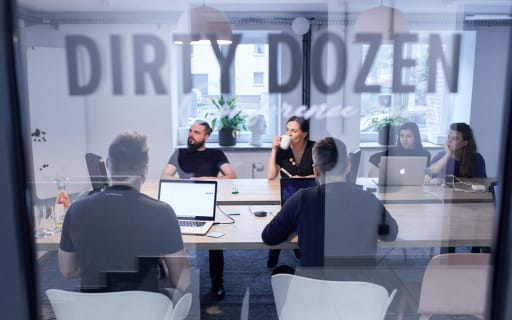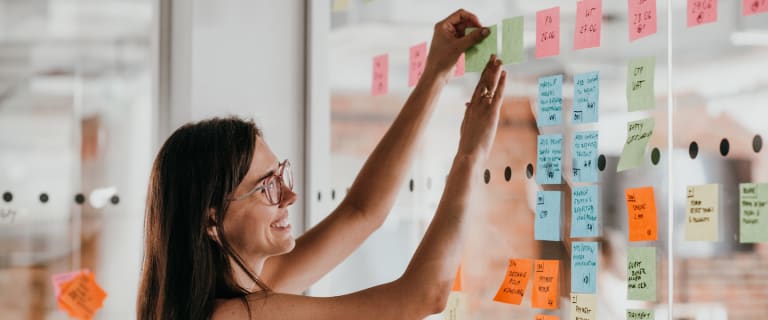Product Discovery Workshops - Practical Insights on How We Do It
If you have ever built a digital product before, you know perfectly well that the product discovery phase is absolutely crucial to the creation of either a new product or development of an existing one. If you haven’t yet, this is something you will learn very quickly. In both cases, it’s important to know what product discovery workshops are and how to conduct them in an effective way. We are very proud from our customer oriented approach, so I would like to share some practical insights with you. This is how we are doing it here, at Boldare!

Table of contents
If you are looking for a Product Discovery Workshop template, you can scroll to the bottom of the article.
What are product discovery workshops?
A product discovery workshop is the very first moment when the magic happens. The development team meets the product’s vision, and the business idea that stands behind it. It’s time to meet and learn from each other, discover each other’s needs and expectations. It’s the first opportunity for real team work.
This is also the time to cut to the chase and think about the functionalities that are soon to be brought to life, as well as discuss the process that we are all going to follow in the near future. And - last but not least - to get to know each other and form a powerful team.
Considering all the above, at Boldare, we always meet with our business partners and analyse their ideas before we start the technical implementation. And we prepare well for that encounter: all the tools and exercises, and everything that happens during the workshop is carefully, individually planned beforehand.
From a development team perspective, to do our best (and it is no difference whether you are outsourcing or cooperating with an in-house team) we need to know as much as we possibly can about the business in question: its goals and mission, plans for the future, the need for the product, the problems that it solves, as well as get to know better the potential users of what we are about to build together.
Why do we need all that? Why can’t we just start implementing the functionalities without a product discovery workshop? There are a few excellent reasons:
- understand why we want to bring the product to market
- define the stage of product maturity (to assess whether we are going to deal with a prototype, MVP or maybe product scaling)
- advise our business partners on possible solutions, even the ones that do not include coding
- make the right technology choices
- understand the risks, but also learn what success means to us and to share this understanding throughout further cooperation.
So, you got to meet your team on the discovery workshop…
But before that happens, there is a lot of preparation going on here at Boldare. Because we analyse each case individually, focused on specific business needs and maturity of the digital product in question, we always spend time on meticulous preparation.
At Boldare, we work in interdisciplinary teams - designers alongside testers, frontend and backend developers together. This means that during the product discovery workshop we have to include space for all of us to get to know the business ideas better, as well as the specific aspects important to our individual professional perspectives.
How to run a product discovery workshop to make it effective?
That was the question that we focused on during a participatory workshop some time ago. We were thinking about how to make our workshops flow better from the perspective of developers, designers and scrum masters, as well as our business partners.
As a result, we defined the few highlights of each product discovery workshop that guided us during the process of setting up the first meeting, from the moment a prospect client expressed their interest in cooperation to the planning of sprint 1.
Here are the top four:
1. Each workshop has its very own guardian.
The New Products Guide is a person that globally takes care of the process and supervises the smooth cooperation between team, business representatives and organization in order to prepare the most outstanding workshop ever. The NPG does their best in supporting all stakeholders in the preparation and planning process, from the level of first shy ideas to the logistical aspects of our meeting. It doesn’t mean that they have to do it on their own or delegate the tasks to others (like a traditional manager), but instead they have the tough task of ensuring that the specific areas are taken care of and that nothing hampers the process.
2. The workshop agenda is a collaborative work.
The meeting agenda is never the same, as it always is predicated on business goals and current product stage. It is arranged around two questions: ‘Why are we going to meet?’ and ‘What should be the best result of the workshop?’.
Creating the discovery workshop agenda is not the effort of a single person, but the common task of several stakeholders. Leading on the agenda creation are scrum masters and business analysts, however we never forget to consult the product development team and give our business partner an opportunity for feedback as well.
Agenda composition is a vital activity that gives all involved parties the opportunity to share their expectations of the meeting and share various ideas on its phases in order to make the best of the time that we are going to spend together.
3. There is no strict scenario or ‘must have techniques’ that will be used.
Once we know why and what we want to accomplish during the product discovery workshop, it’s finally the time to select the right tools and techniques. We pick the ones that will actually help us define the product, starting with classics like user story mapping and product canvas, through business modelling, roadmaps and exercises focused on getting to know the users better, ending up with event storming or impact mapping or even something especially designed for the purpose of the meeting.
4. We are open to changes and challenges.
Ok, the agenda is now approved and ready. Does that mean that we need to stick to it at all costs? Not at all! It happens a lot that we change the agenda during the workshop based on new discoveries and needs if we find that change beneficial. A common understanding of the workshop flow and previous discussions about the agenda, both with team and client, let us make smarter decisions faster.
What happens after the product discovery workshops?
By the end of the meeting, we have participated in the discovery workshop together, learned about the product, and planned the next steps. But that is not enough. After our meeting ends, a few more important elements have to happen:
1. Feedback
We would never improve if we did not ask for honest opinions. That is why all participants, development team and business representatives, receive a short evaluation form in which we ask how the meeting matched up with expectations, how confident we felt about the preparation stage, how we can improve our engagement, which elements really rocked, and which will need more attention in similar situations in the future. Gathering these experiences and their analysis brings new ideas to the very next workshop (e.g. on how to do amazing notes or keep the participants focused and driven).
2. Workshop summary
As soon as possible, the results of the work done are shared with the workshop authors. Usually in the form of a report with external links (for example, notes taken during the workshop) and other artefacts (or photos of them, e.g. stickies on the wall, posters, etc.).
Having a summary of the discovery workshop gives us two major advantages. Firstly, it’s a good reminder of the discussion, we can go back to the observations after a few days with a fresh attitude. Secondly, if there is a need to introduce a new team member, we can share the workshop insights to help him/her better understand the general context of the product.
What is in it for you?
Not a minute will be wasted. We value your time (as well as ours). Moreover, creating a new product or developing an existing solution is always about learning. And that ‘double-happens’ during product discovery workshops. Obviously, the development team learns your vision of the product, but at the same time you might learn something about it as well - the external perspective on something that accompanies you at all times, can be a refreshing experience.
It might sound like a cliche, but the better prepared the product discovery workshop template, the smoother the development starts. The tips I shared may not be revolutionary, but I can vouch that they are indeed game-changing factors. The start of any cooperation on a new product is definitely a time for creativity but it also requires integrity, and a systematic and solid approach to ensure that we all are on the same page, ready for new challenges.
Product Discovery Workshops template
If you want to see the tools we use to build a Product Discovery Workshop agenda, you can use our template. It consist of 10 tools we usually combine to create bespoke workshops for our clients. It consist of templates for such tools like Business Model Canvas, User Story Mapping, Value Proposition Canvas and more. You can get it here.
Share this article:







